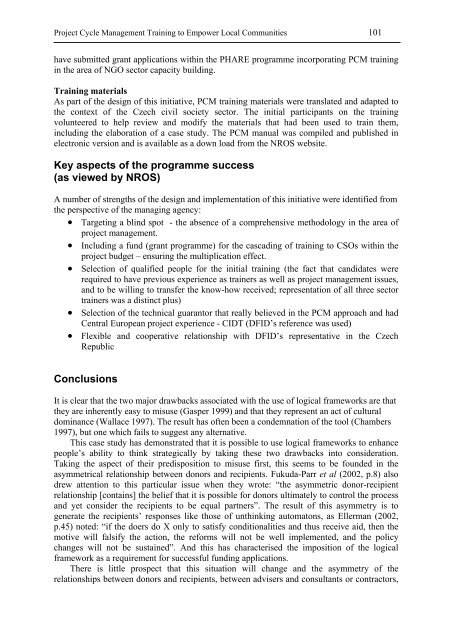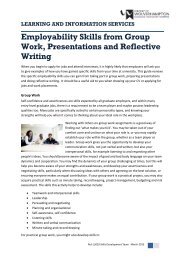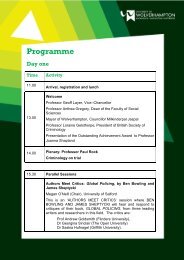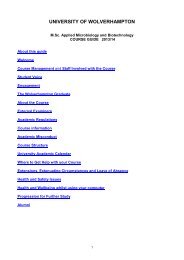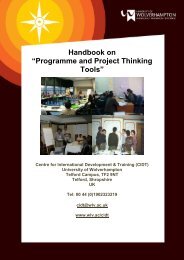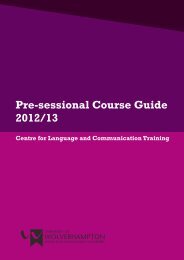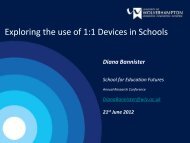Project Cycle Management training to empower local communities
Project Cycle Management training to empower local communities
Project Cycle Management training to empower local communities
Create successful ePaper yourself
Turn your PDF publications into a flip-book with our unique Google optimized e-Paper software.
<strong>Project</strong> <strong>Cycle</strong> <strong>Management</strong> Training <strong>to</strong> Empower Local Communities 101have submitted grant applications within the PHARE programme incorporating PCM <strong>training</strong>in the area of NGO sec<strong>to</strong>r capacity building.Training materialsAs part of the design of this initiative, PCM <strong>training</strong> materials were translated and adapted <strong>to</strong>the context of the Czech civil society sec<strong>to</strong>r. The initial participants on the <strong>training</strong>volunteered <strong>to</strong> help review and modify the materials that had been used <strong>to</strong> train them,including the elaboration of a case study. The PCM manual was compiled and published inelectronic version and is available as a down load from the NROS website.Key aspects of the programme success(as viewed by NROS)A number of strengths of the design and implementation of this initiative were identified fromthe perspective of the managing agency:• Targeting a blind spot - the absence of a comprehensive methodology in the area ofproject management.• Including a fund (grant programme) for the cascading of <strong>training</strong> <strong>to</strong> CSOs within theproject budget – ensuring the multiplication effect.• Selection of qualified people for the initial <strong>training</strong> (the fact that candidates wererequired <strong>to</strong> have previous experience as trainers as well as project management issues,and <strong>to</strong> be willing <strong>to</strong> transfer the know-how received; representation of all three sec<strong>to</strong>rtrainers was a distinct plus)• Selection of the technical guaran<strong>to</strong>r that really believed in the PCM approach and hadCentral European project experience - CIDT (DFID’s reference was used)• Flexible and cooperative relationship with DFID’s representative in the CzechRepublicConclusionsIt is clear that the two major drawbacks associated with the use of logical frameworks are thatthey are inherently easy <strong>to</strong> misuse (Gasper 1999) and that they represent an act of culturaldominance (Wallace 1997). The result has often been a condemnation of the <strong>to</strong>ol (Chambers1997), but one which fails <strong>to</strong> suggest any alternative.This case study has demonstrated that it is possible <strong>to</strong> use logical frameworks <strong>to</strong> enhancepeople’s ability <strong>to</strong> think strategically by taking these two drawbacks in<strong>to</strong> consideration.Taking the aspect of their predisposition <strong>to</strong> misuse first, this seems <strong>to</strong> be founded in theasymmetrical relationship between donors and recipients. Fukuda-Parr et al (2002, p.8) alsodrew attention <strong>to</strong> this particular issue when they wrote: “the asymmetric donor-recipientrelationship [contains] the belief that it is possible for donors ultimately <strong>to</strong> control the processand yet consider the recipients <strong>to</strong> be equal partners”. The result of this asymmetry is <strong>to</strong>generate the recipients’ responses like those of unthinking au<strong>to</strong>ma<strong>to</strong>ns, as Ellerman (2002,p.45) noted: “if the doers do X only <strong>to</strong> satisfy conditionalities and thus receive aid, then themotive will falsify the action, the reforms will not be well implemented, and the policychanges will not be sustained”. And this has characterised the imposition of the logicalframework as a requirement for successful funding applications.There is little prospect that this situation will change and the asymmetry of therelationships between donors and recipients, between advisers and consultants or contrac<strong>to</strong>rs,


